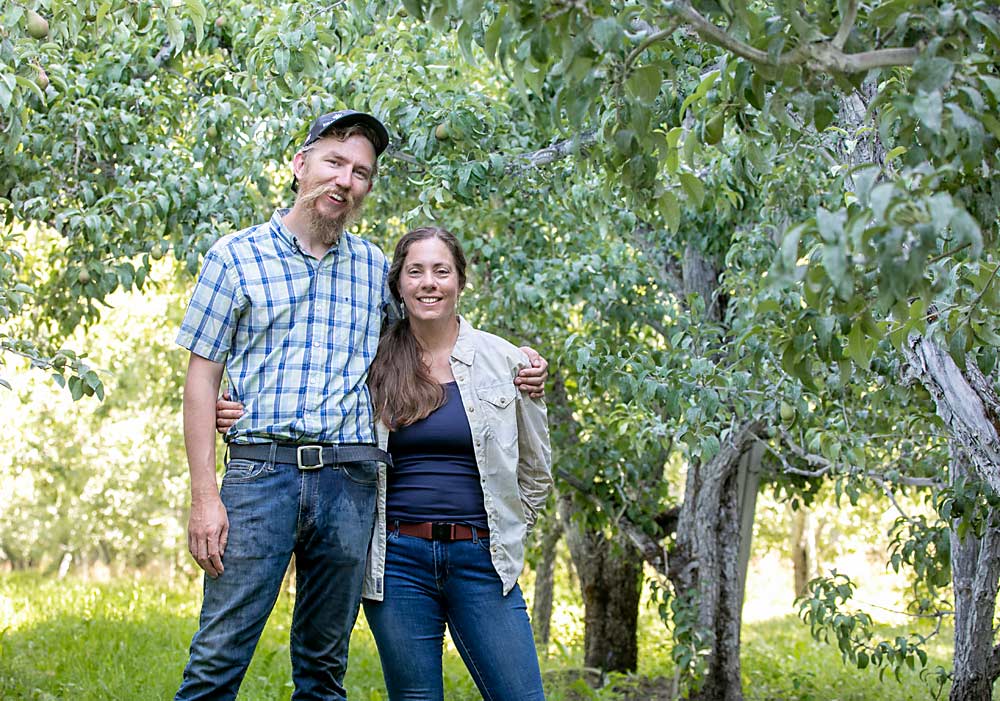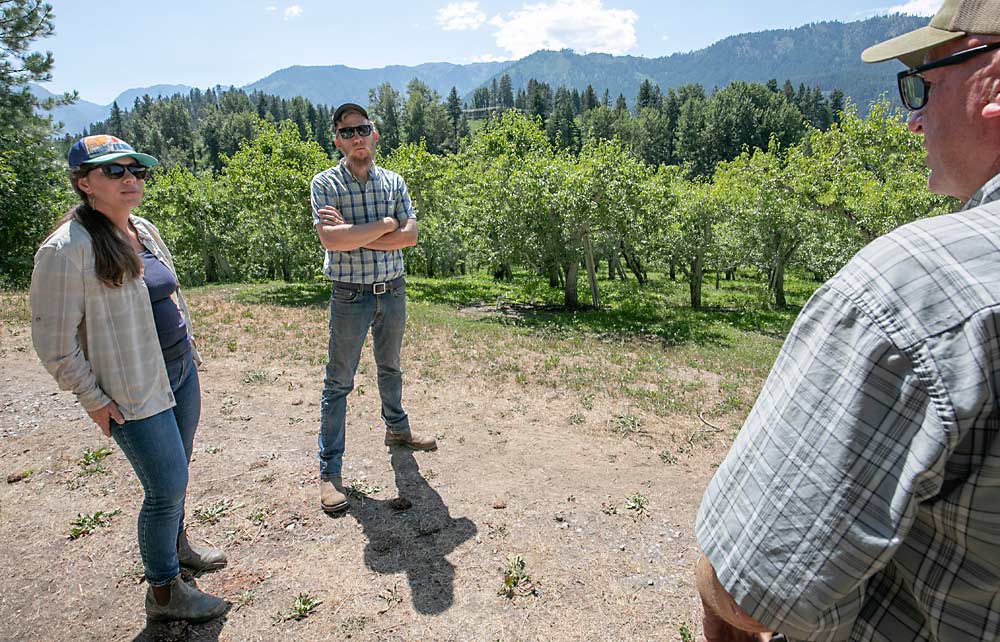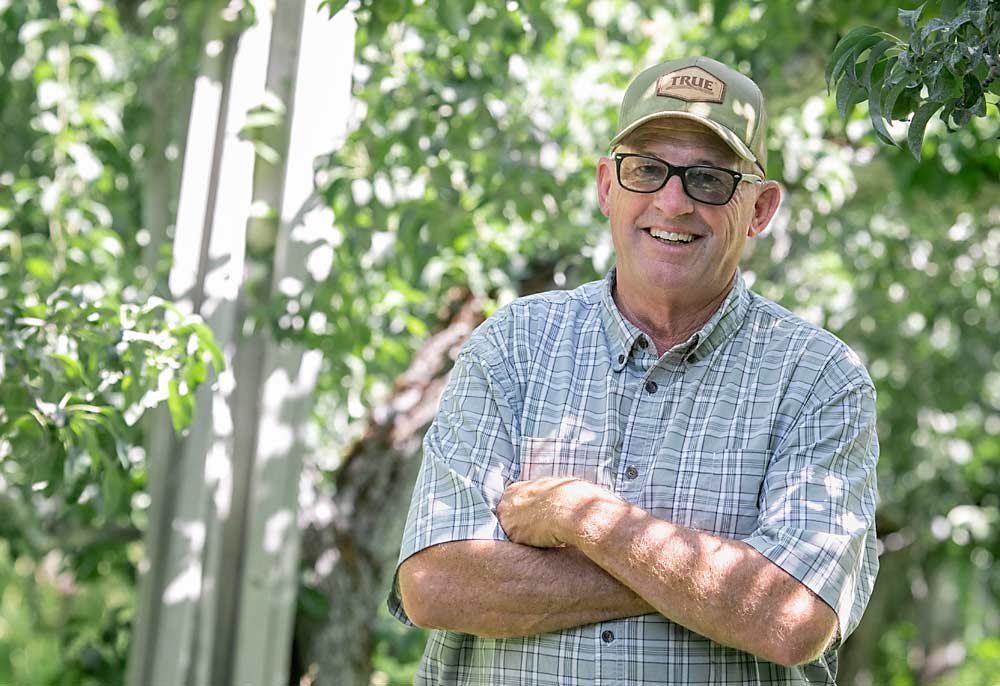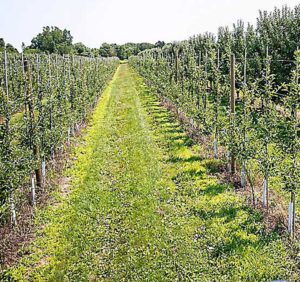
The newly christened Chumstick Creek Ranch will harvest its first crop this year.
The first harvest for the growers, that is. Glade Brosi and Andrea Bixby-Brosi bought the 14-acre orchard just outside Leavenworth, Washington, in January to launch their decade-long dream of operating their own orchard. The trees, on the other hand, were producing decades before their new owners were born, and this year, conditions led to a light crop.
“We needed 500 bins and we’re going to get 300,” Brosi said during a tour of the orchard in July. “The problem with buying an orchard is the first year you are behind. We’re borrowing money to farm this.”
Growers are paid as their warehouse sells their fruit. But when you buy an orchard, last year’s returns go to the former grower, leaving new owners operating an orchard for 18 months or more before the first check comes in, Brosi said. It’s one thing to budget for that while developing a business plan, and another thing to live it, added Bixby-Brosi.
Their story illustrates the challenges — and financial risk — new farmers face. It also highlights how industry support can make it possible to surmount them.
“If you weren’t blessed with inheriting a multimillion dollar orchard, you have to be coachable,” Brosi said. “You have to find people that want to help you, and with the work we’ve done in the past in this valley, we’ve worked with a lot of growers and we have those relationships.”

The Brosis have been building connections in the valley since Bixby-Brosi’s postdoctoral fellowship in entomology brought the couple to Wenatchee in 2011. Meanwhile, Brosi worked in research and development at Stemilt Growers and as a crop consultant, now with True Organics Products.
Bixby-Brosi credits industry support for making their first season as farmers possible. An operating loan from their new co-op, Blue Star Growers, got them up and running. WSU extension specialist Tianna DuPont and many growers in the valley answer their many, many questions. Troy Davis, who formerly leased the property, connected the Brosis to it when they were seeking land and has become a mentor and friend.
Davis, who sees his younger self in the Brosis, views helping them grow their budding business as part of his retirement strategy. Watching the orchard he leased for 23 years remain in operation, under the stewardship of new growers — rather than sold off for housing development in the hot Leavenworth market — helps to ensure his longtime employees continue to have work.
“That’s a big deal,” Davis said. “They are like family to me.”
He also leases a larger neighboring block that the couple plans to assume the lease on next year. In the meantime, that’s made it easier to loan the new farmers equipment, and in his day job with Chamberlin Ag, he serves as their pest consultant.

“We couldn’t do this without him,” Bixby-Brosi said.
Davis shrugs that off, adding that he benefited from mentorship from Fred Valentine and Bob Bosen early in his career. And he urges the Brosis not to panic due to one low-yield year.
“That’s how I got in, too. These orchards were losing lots of money,” and the former owners wanted out of the business, Davis said. “People don’t lease out orchards when they are making money.”
Like the Brosis, an operating loan from Blue Star Growers helped him build his business.
“I went 10 years being financed by the co-op before I could finance myself,” Davis said.
With today’s interest rates and little proof that they can run a successful orchard, bank financing would have been a major roadblock, Brosi added. The per-bin financing helps them “spend the money it takes to make money in pears,” he said.
From the warehouse side, it’s solid strategy to support growers starting out, bringing in more pears and preventing good orchards from being sold for development, said Gene Woodin, the new Blue Star general manager.
“That’s important, because no one is going to be bulldozing houses to plant orchards,” he said.
Basically, it’s growers lending to other growers.
“It says a lot that the growers trust the warehouse with their savings,” said Blue Star board member Erica Bland-McConnell. She sees young growers struggle to afford to buy orchards and worries that if people aren’t able to make enough money, the industry will fail to recruit its needed next generation.
Around the co-op, people tend to refer to the Brosis as “young growers,” but they point out that they are in their early 40s. It took a decade of being laser-focused on this goal to be in the financial position to buy the orchard, Brosi said, and to have the network in place to be successful.
Now, they have plans to grow by leasing more acres, as Davis phases out over the next few years.
“Leasing will be the way to grow, because it’s just so expensive,” Brosi said.
Lower yields this year will complicate that plan, but they are still feeling confident.
“Pear farming is risky, but owning this land is not,” Bixby-Brosi said. “This is a high-value piece of property, and we feel like investing in land is better than investing in the stock market.”
Davis agrees.
“They are smart, smart business people,” he said.
—by Kate Prengaman








Leave A Comment